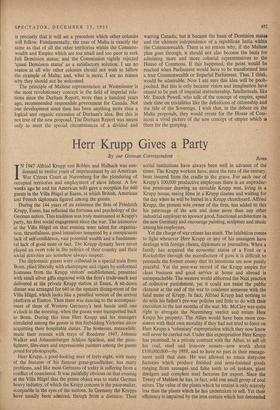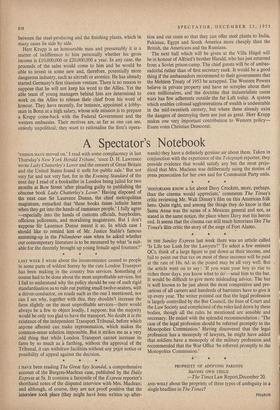Herr Krupp Gives a Party
IN 1947 Alfried Krupp von Bohlen and Halbach was con- demned to twelve years of imprisonment by an American War Crimes Court at Nuremberg for the plundering of occupied territories and employment of slave labour. A few weeks ago he and his American wife gave a reception for 640 guests in the Villa Hugel at Essen, at which British, American and French diplomats figured among the guests.
During the 144 years of its existence the firm of Friedrich Krupp, Essen, has reflected the fortunes and psychology of the German nation. This tradition was truly maintained at Krupp's party, his first social engagement since the war. The leitmotive at the Villa Hiigel on that evening were talent for organisa- tion, thrustfulness, good intentions tempered by a conspicuous lack of self-confidence, vast potential wealth and a fundamen- tal lack of good taste or tact. The Krupp dynasty have never played an overt role in the politics of their country and their social activities are somehow always suspect.
The diplomatic guests were, collected in a special train from Bonn, plied liberally with champagne and cigars by uniformed hostesses from the Krupp visitors' establishment, presented with small silver gifts engraved with the firm's trade-mark and delivered at the private Krupp station at Essen, A sit-down dinner was arranged for 640 in the upstairs dining-room of the Villa Hilgel, which looks like a panelled version of the arrival platform at Euston. Then there was dancing to the accompani- ment of three of Western Germany's best bands until one o'clock in the morning, when the guests were transported back to Bonn. During this time Herr Krupp and his managers circulated among the guests in this forbidding Victorian decor acquitting their hospitable duties. The hostesses, meanwhile, made their rounds with trays of Roederer 1947, Johnnie Walker and Johannisberger Schloss Sp4tlese, and the prize- fighters, film-stars and expressionist painters among the guests posed for photographs.
Herr Krupp, a good-looking man of forty-eight, with many of the features of his famous great-grandfather, has many problems, and like most Germans of today is suffering from a conflict of conscience. It was painfully obvious on that evening at the Villa Hfigel that the prime object was to make German heavy industry, of which the Krupp concern is the pace-maker, acceptable in the eyes ,of the nations. In Germany the Krupps have usually been admired, though from a distance. Their social institutions have always been well in advance of the times. The Krupp workers have, since the turn of the century, been insured from the cradle to the grave. For each one of Krupp's 100,000 productive employees there is an unproduc- tive pensioner drawing an enviable Krupp rent, living in a Krupp house, seeing films in a Krupp cinema and waiting for the day when he will be buried in a Krupp churchyard. Alfried Krupp, the present sole owner of the firm, has added to this his patronage of the arts and done more than any other industrial employer to sponsor good, functional architecture in the new Germany and encourage painting, sculpture and music among his employees.
Yet the charge of war crimes has stuck. The inhibition comes to light whenever Herr Krupp or any of his managers have dealings with foreign clients, diplomats or journalists. When a family has acquired the economic status of a Ford or a Rockefeller through the manufacture of guns it is difficult to persuade the former enemy that its intentions are now purely peaceful. Yet the post-war record of the Krupp empire for clean business and good service at home and abroad is unimpeachable. The western world abhorred the Nazi practice of collective punishment, yet it could not resist the public clamour at the end of the war to condemn someone with the fatal name of Krupp. In fact, Alfried Krupp had nothing to do with his father's pre-war policies and little to do with their execution in the last months of the war. Mr. McCloy was quite right to abrogate the Nuremberg verdict and return Herr Krupp his property. The Allies would have been more con- sistent with their own morality if they had not tried to force on Herr Krupp a 'voluntary' expropriation which they now know will never be carried out. Under this expropriation Herr Krupp has promised, in a private contract with the Allies, to sell all his coal, steel and iron-ore asssets—now worth about £100,000,000—by 1958, and to have no part in their manage- ment until that date. He was allowed to retain sixty-one factories which produce finished and semi-finished goods ranging from sausages and false teeth to oil tankers, giant dredgers and complete steel factories for export. Since the Treaty of Mehlem he has, in fact, sold one small group of coal mines. The value of the plants which he retains is only scarcely less than the plants which he has undertaken to sell. Yet their efficiency is impaired by the iron curtain which has descended between the steel-producing and the finishing plants, which in many cases lie side by side.
Herr Krupp is an honourable man and presumably it is a matter of indifference to him personally whether his gross income is £10,000,000 or £20,000,000 a year. In any case, the proceeds of the sales would come to him and he would be able to invest in some new and, therefore, potentially more dangerous industry, such as aircraft or atomics. He has already started Germany's first titanium venture. There is no reason to suppose that he will not keep his word to the Allies. Yet the able team of young managers behind him are determined to work on the Allies to release their chief from his word of honour. They have recently, for instance, appointed a lobby- man in Bonn at a high salary, whose sole mission is to prepare a Krupp come-back with the Federal Government and the western embassies. Their motives are, as far as one can see, entirely unpolitical; they want to rationalise the firm's opera- tion and cut costs so that they can offer steel plants to India, Pakistan, Egypt and South America more cheaply than the British, the Americans and the Russians.
The next ball which will be given at the Villa Hugel will be in honour of Alfried's brother Harald, who has just returned from a Soviet prison-camp. The chief guests will be of ambas- sadorial rather than of first secretary rank. It would be a good thing if the ambassadors recommend to their governments that the Mehlem Treaty of 1953 be scrapped. The Western Powers believe in private property and have no scruples about their own millionaires, and the doctrine that industrialists cause wars has few adherents outside the far Left today. A system which enables colossal agglomerations of wealth is undesirable in the mid-twentieth century, but where these already exist the dangers of destroying them are just as great. Herr Krupp makes one very important contribution to Western policy— Essen votes Christian Democrat.



































 Previous page
Previous page